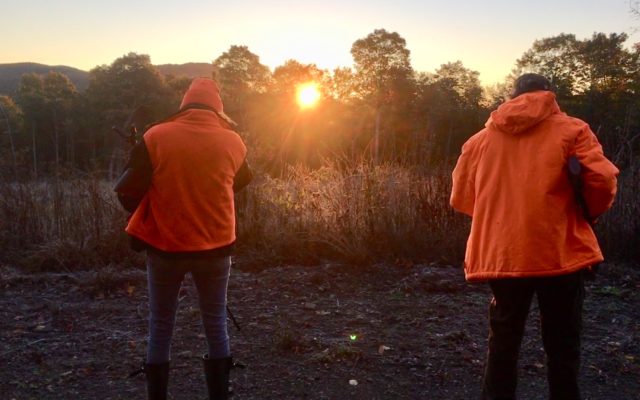
Dusty roads present hazard for moose hunters as season starts
One of the best things about a Maine moose hunt is the fact that those adventures typically happen miles from paved roads, in some of the state’s wildest places. This year though, with severe drought ravaging much of the state, those unpaved roads might present an unusual challenge when the first moose season starts on Monday, according to the state moose biologist.
“It’s dry as hell, and as dusty as all get out [on roads in the North Maine Woods],” said Lee Kantar of the Maine Department of Inland Fisheries and Wildlife. “If you’re following people [on those roads], you’ve got to be aware of the dust situation. People are going to have to pull over and stop and wait for the dust to clear. It is not smart to be driving down that road in a cloud of dust. It is bad. It’s as bad as it gets for dust.”
Add in some expected warm weather, and hunters will face a double-edged dilemma: How to get the moose cooled down quickly, and back to a butcher without the meat getting dirty.
“If you shoot a moose in the afternoon it’s going to be too warm, you’re going to have to get that moose cooled down, and when you’re bringing it out you’re also going to have to cover the meat so it doesn’t get encased in dust,” Kantar said. “I don’t know how we emphasize this enough for people. This is the real deal. You’ve got everything against you next week.”
Those dusty conditions can be very dangerous. In 2017 a man died after he crashed into a parked logging truck on the Golden Road in north-central Maine. Visibility was limited due to a “whiteout” caused by the dust another truck was kicking up.
Maine wildlife officials have allotted 3,135 moose permits for this year’s hunting seasons.
This year’s moose season breakdown:
— Sept. 28-Oct. 3: 955 bull-only permits allotted for 11 Wildlife Management Districts.
— Oct. 12-17: 1,395 bull-only permits allotted for 18 Wildlife Management Districts.
— Oct. 26-31: 745 cow-only permits allotted for 6 Wildlife Management Districts.
— Nov. 2-28 (including Oct. 31 for Maine residents): 40 any-moose permits allotted for 2 Wildlife Management Districts.
Kantar said that with warm conditions expected, hunters might have to change their tactics a bit. But he said the heat won’t keep the moose from mating during the September season, if cows go into estrus.
“The bottom line is, when [cows are ready to mate], bulls are seeking females and females are getting ready to breed. It doesn’t matter what the temperature is, or the moon phase, or whatever other people might think,” Kantar said.
But on warm days, the moose just might not be out in the open where many people expect them to be.
“If moose aren’t showing up where you think, I think that indicates they’re probably hanging out closer to cover, and you’re going to want to hunt areas that are a mix of hardwood and softwood. A big, open hardwood cut might not be the best area,” Kantar said. “For at least the September season, staying closer to areas where there are water sources is not a bad bet.”
The news isn’t all bad, though: Drought, along with some more recent weather trends, might present some opportunities for hunters.
“In District 8, near Moosehead, you’re almost in full foliage right now. There’s a lot of color out there. And with the winds of the remnants of the hurricane coming through I think we’re going to get some better visibility [as leaves are blown off branches],” Kantar said. “And I also think that [hunters] are going to be able to shoot some grouse during the early season.”
Ruffed grouse season begins on Saturday, Sept. 26, so grouse hunters and moose hunters will be sharing the woods.
Another potential positive, according to Kantar, involves the overall health of moose.
“The only good part about a drought is that it has the potential to hold ticks down at their early stage,” Kantar said. “A couple years ago we had an August drought that dried out the eggs of winter ticks and we think it put some hurting on the winter ticks.”
The state has been studying the effect of winter ticks on the moose herd for seven years, and has determined that the ticks are a major cause of moose mortality in some areas.
“This drought is even extending into the time when eggs will hatch and larvae are climbing up on bushes,” Kantar said. “Ticks are very sensitive to moisture. Moisture in the air and moisture on the ground. I’m hoping this does some killing [of ticks]. We’ll know a little bit more in October [when the ticks begin to show up on the bodies of hunter-killed moose].”
Maine’s modern moose hunt was first staged on an experimental basis in 1980. After a one-year hiatus, the hunt was again held in 1982 and has been an annual event ever since.